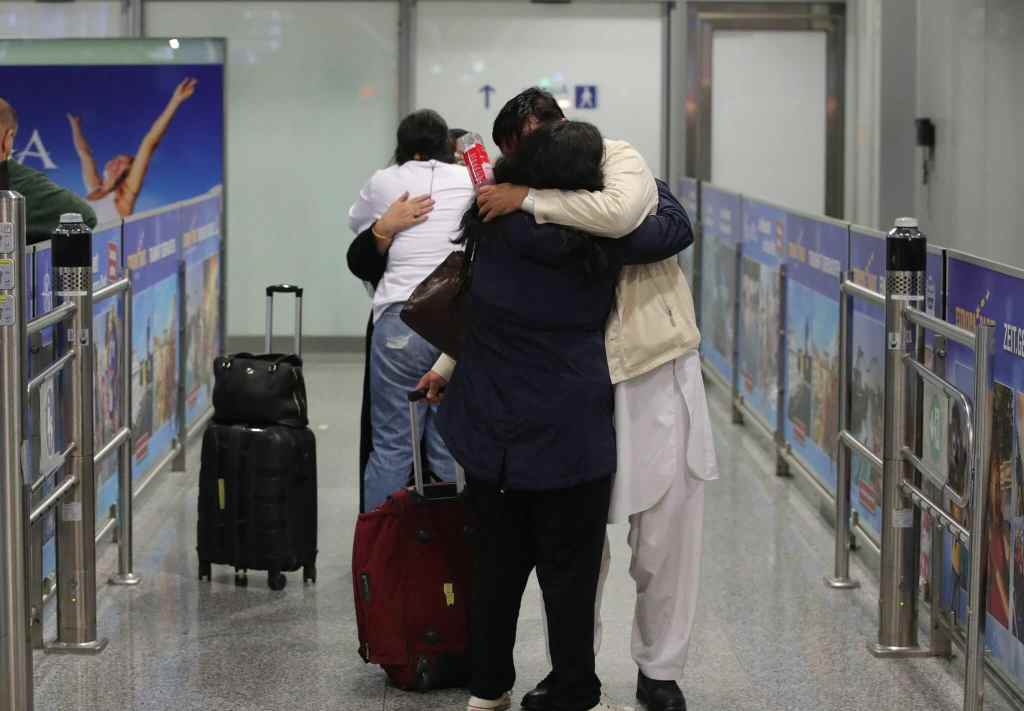International Criminal Court seeking arrests over LGBTQ+ and gender persecution in Afghanistan

The International Criminal Court’s chief prosecutor is seeking the arrest of two senior Taliban figures (WAKIL KOHSAR/AFP via Getty Images)
The ICC’s chief prosecutor is seeking the arrest of two senior Taliban figures for the “unprecedented, unconscionable and ongoing persecution” of LGBTQ+ folks amid spiralling gender inequality in Afghanistan.
Karim Khan KC announced on Thursday (23 January) the court had filed two applications for warrants of arrest for Taliban supreme leader Hibatullah Akhundzada and chief justice Abdul Hakim Haqqani, who both “bear criminal responsibility for the crime against humanity of persecution on gender grounds.”
The court said Akhundzada and Haqqani are “criminally responsible” for the persecution of Afghan women and girls, as well as those who the Taliban view as “not conforming with their ideological expectations of gender identity or expression” and persons “perceived as allies of girls and women.”
Khan said in the Afghanistan gender inequality warrant: “This ongoing persecution entails numerous severe deprivations of victims’ fundamental rights, contrary to international law, including the right to physical integrity and autonomy, to free movement and free expression, to education, to private and family life, and to free assembly.”
The requests for warrants of arrest are based on “diverse” evidence, including expert and witness testimonies, official decrees, forensic reports, statements by the suspects themselves and other Taliban representatives, and audio-visual material, Khan added.
“Gender apartheid”

The LGBTQ+ community is named in the warrant, which LGBTQ+ rights organisation ILGA World notes marks the first time the community has been “explicitly mentioned in a warrant of arrest by the ICC prosecution.”
Following the Taliban’s take over of the country in August 2021, women’s, LGBTQ+ and wider human rights groups have continually criticised the deteriorating situation in Afghanistan, which has been described as a gender apartheid.
The rights of women and girls have been continually reduced, with women and girls banned from studying – including midwifery and nursing – visiting parks, leaving their homes without a male chaperone as well as reading, singing, or speaking in public due to the “temptation” of the female voice.
In Afghanistan, LGBTQ+ Afghans face intense, systematic persecution. Homosexuality is illegal and results in the death penalty, honour killings are encouraged and cross dressing is illegal.

In September, Hollywood actress Meryl Streep told the United Nations General Assembly in New York that cats and squirrels have more rights than a woman does in Afghanistan.
“A cat may go sit on her front stoop and feel the sun on her face. She may chase a squirrel into the park. A squirrel has more rights than a girl in Afghanistan today, because the public parks have been closed to women and girls by the Taliban,” the star said.
In a statement Julia Ehrt, executive director of ILGA World said “It is truly groundbreaking for the International Criminal Court to recognise our communities among the victims and survivors of the most heinous crimes and their consequences, and to acknowledge gender identity and gender expression among the drivers of human rights violations.
“These warrants of arrest cast a light on human rights violations that civil society has long documented, and that the world can no longer ignore.”
Henry Koh, Executive Director of ILGA Asia. said LGBTQ+ Afghans have faced “relentless persecution” since the Taliban returned to power.
“Since the Taliban’s return to power, LGBTIQ+ Afghans have faced relentless persecution, including death threats, harassment, arbitrary arrests, sexual violence, and killings.
“These acts are blatant violations of international human rights law and the principles of dignity and equality enshrined in the Universal Declaration of Human Rights.
“The global community must uphold its legal obligations by prioritising the protection needs of women, girls and LGBTIQ+ people in humanitarian responses and expanding resettlement programmes to offer safe pathways to those fleeing systemic violence.
“Justice and accountability are vital to ensuring human rights are upheld for all.”
How did this story make you feel?

